Search Images
Browse Content (p. 1003)
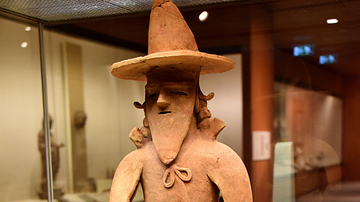
Image
Haniwa Figure of a Chieftain
This haniwa tomb figure is thought to represent a chieftain. He wears a tall wide-brimmed hat, his hair is plaited in a style called mizura, and there is a sword on his belt. It came from Ibaraki prefecture in eastern Japan; it was in this...
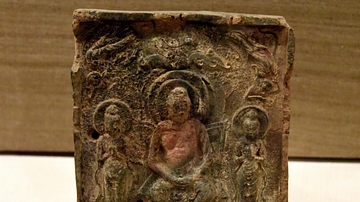
Image
Buddha Plaque from Japan
The Buddha sits on a canopied lotus throne in front of the Bodhi tree where he became enlighted. He is surrounded by attendants and Buddhist angels rain down flowers. Temple walls in China were decorated with such plaques and this one probably...
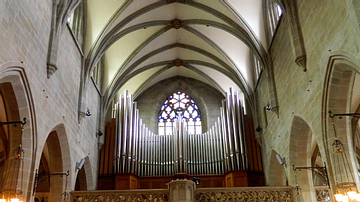
Image
Grossmunster Interior, Zurich
The interior of Grossmünster (“large cathedral” in German), a Romanesque ex-cathedral situated in the heart of Zürich, Switzerland, which was built over the course of the 11th and 13th centuries CE.
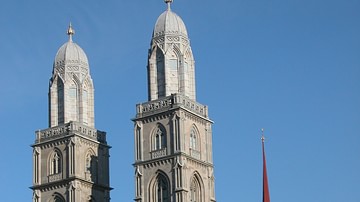
Image
Grossmunster, Zurich
Grossmünster (“large cathedral” in German) is a Romanesque ex-cathedral situated in the heart of Zürich, Switzerland, which was built over the course of the 11th and 13th centuries CE.
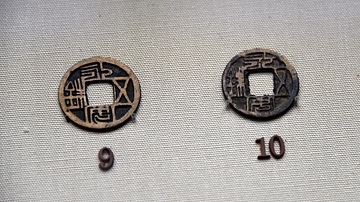
Image
Bronze Wuzhu Coin
The inscription yong'an wuzhu, 5 gram coin of Yong'an period, is one of the earliest dated coin inscriptions. Copper alloy. Obverse, 4-character Chinese inscription. Minted in China; ruler Emperor Xiaozhuangdi. Northern Wei Dynasty, c. 529...
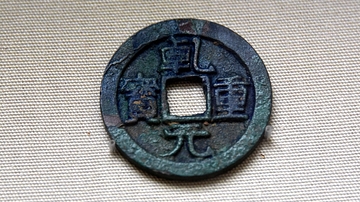
Image
Bronze Qianyuan Heavy Coin
This is a copper alloy coin with a double rim, worth 50 standard coins. Obverse, Chinese inscription. Minted in China. Tang Dynasty, 759 CE. (The British Museum, London).
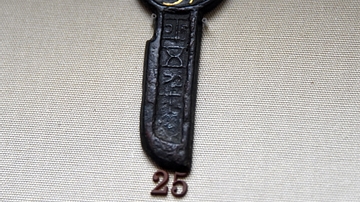
Image
Bronze Knife Coin
So-called knife money, worth 5000 standard coins. Obverse, Chinese inscription. Minted in China; ruler Wang Mang. Wang Mang's four coinage reforms were not successful and the widely accepted wuzhu were soon re-issued. Xin Dynasty, 9-23 CE...
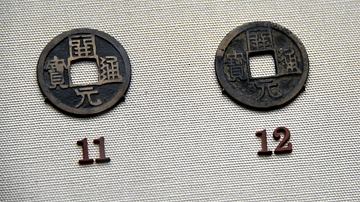
Image
Bronze Haiyuan Tongbao Coin
Also called Kaiyuan tongbao. This was the first imperial coin to use a four-character inscription with the term tongbao , meaning "coin", (circulating money), which then became customary on Chinese coins up to the 20th century. Copper alloy...
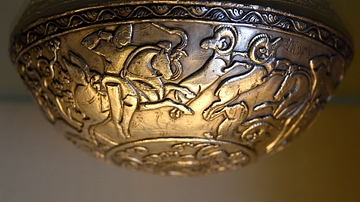
Image
Silver Bowl Decorated with Figure Scenes from Pakistan
The external surface of this thick-walled silver bowl was inscribed and decorated with a central male figure surrounded by four hunters; two hunters wear crowns similar to last Kidarite coins. It was originally gilded. Hephthalite period...
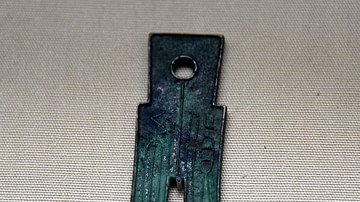
Image
Chinese Bronze Hoe Coin
Bronze spade money (worth 25 standard coins) with Chinese inscription, minted in China under the rule of Wang Mang, Xin Dynasty, 9-23 CE. Wang Mang's four coinage reforms were not successful and the widely accepted wuzhu were soon reissued...